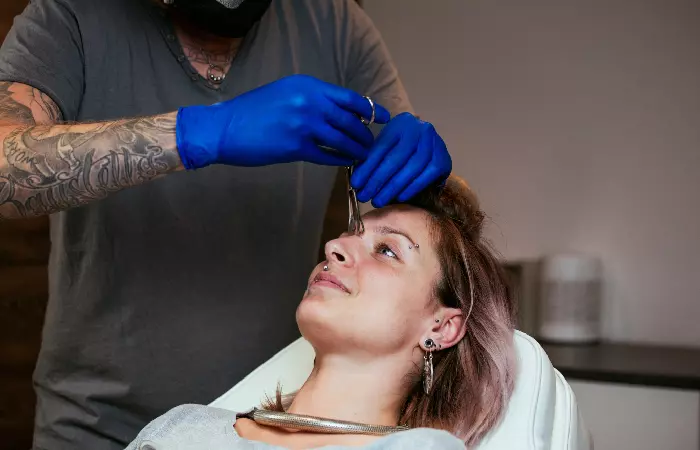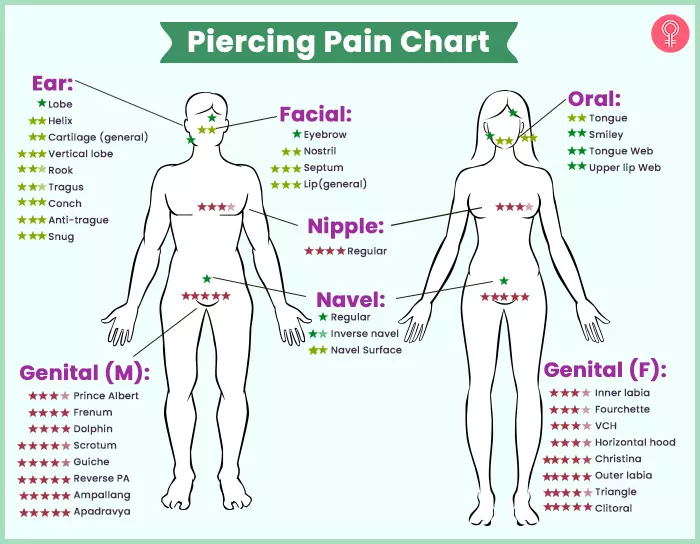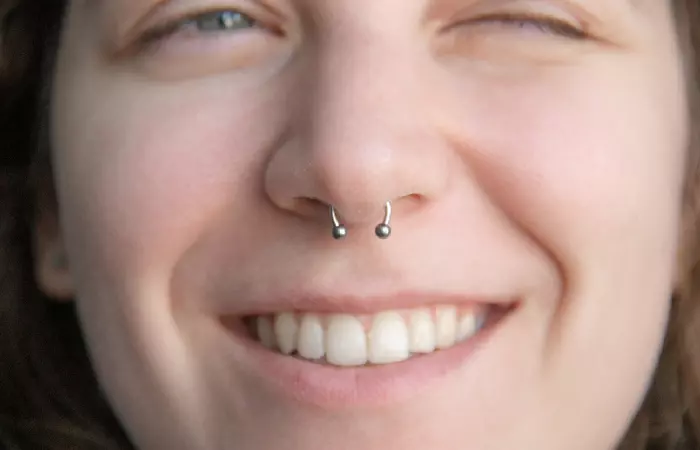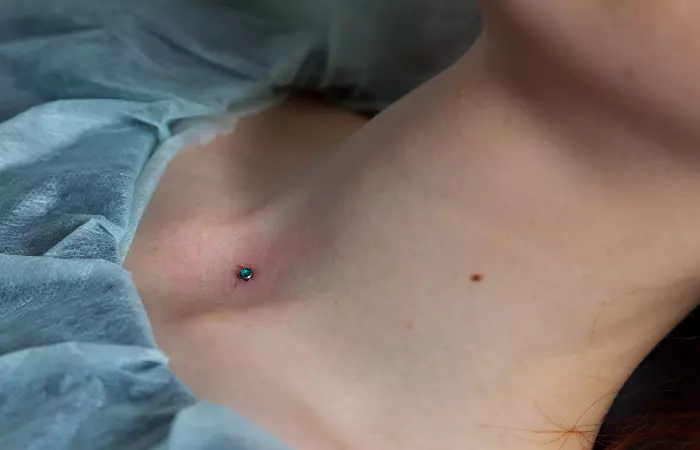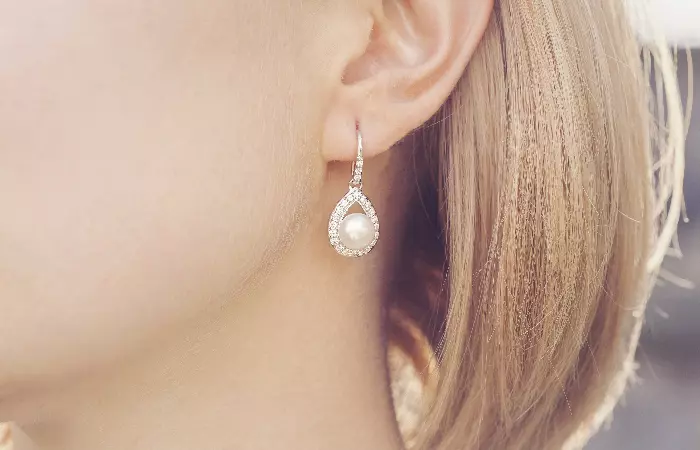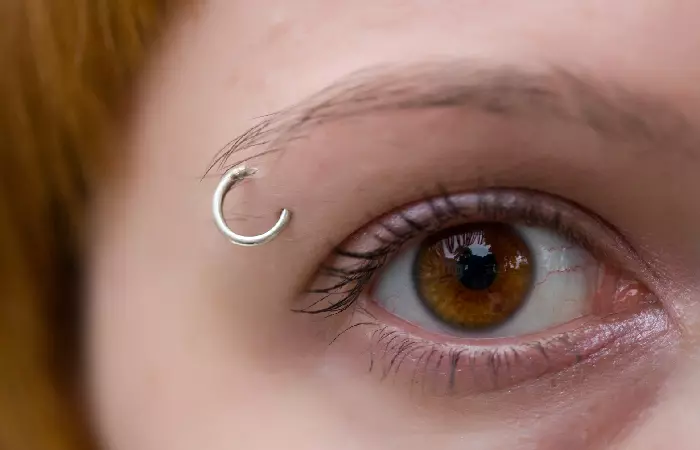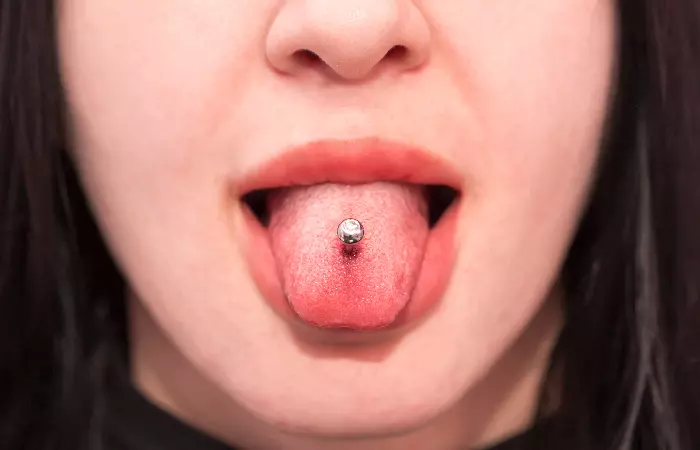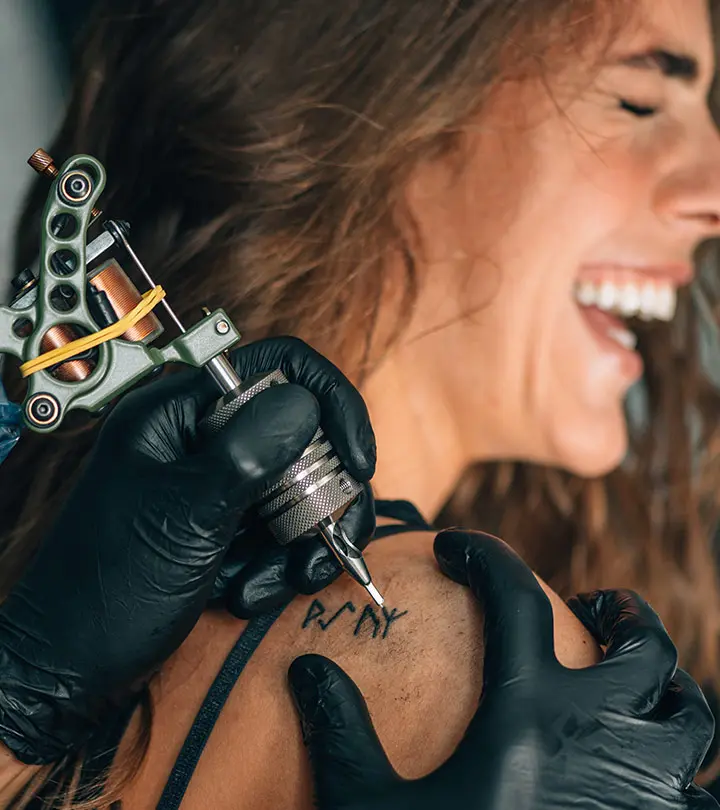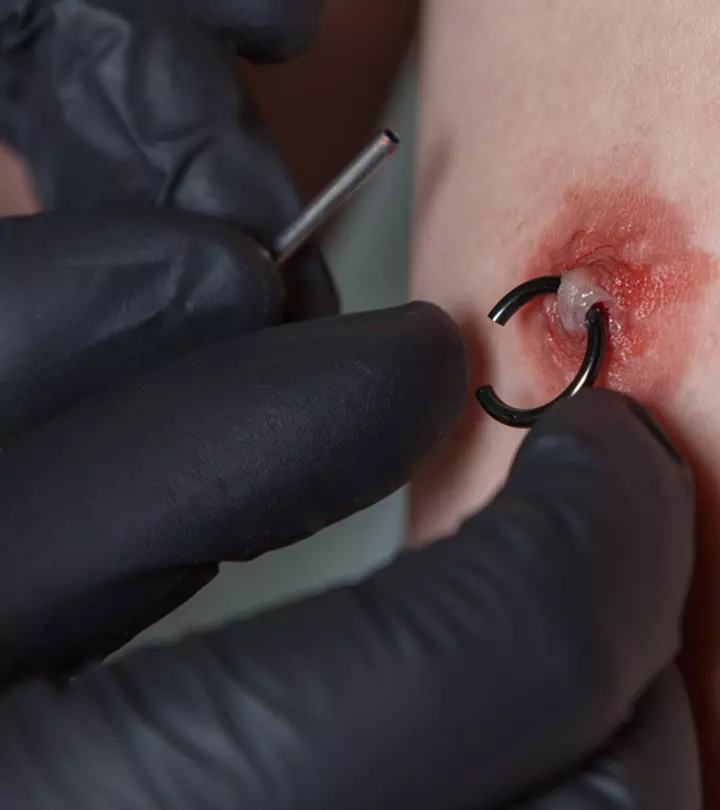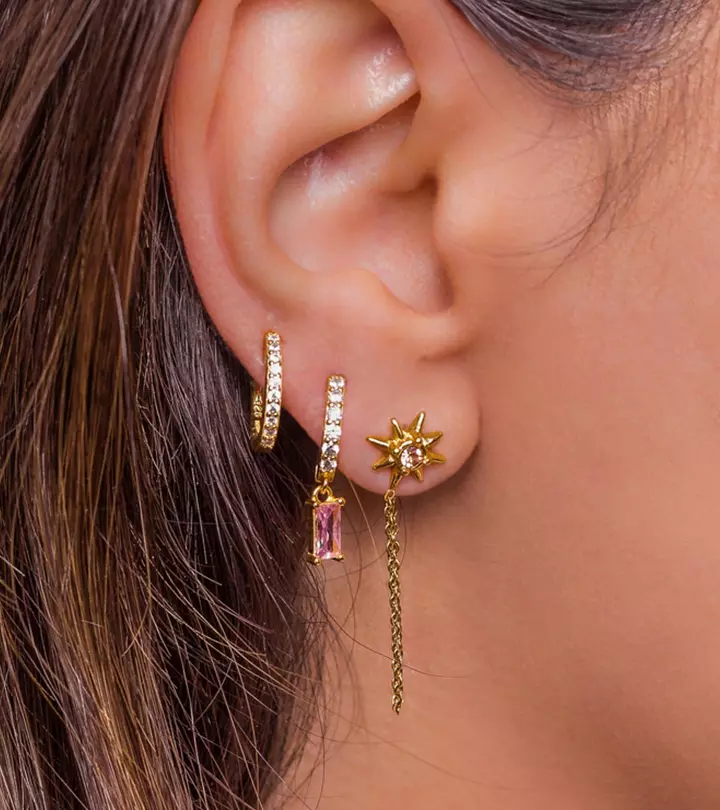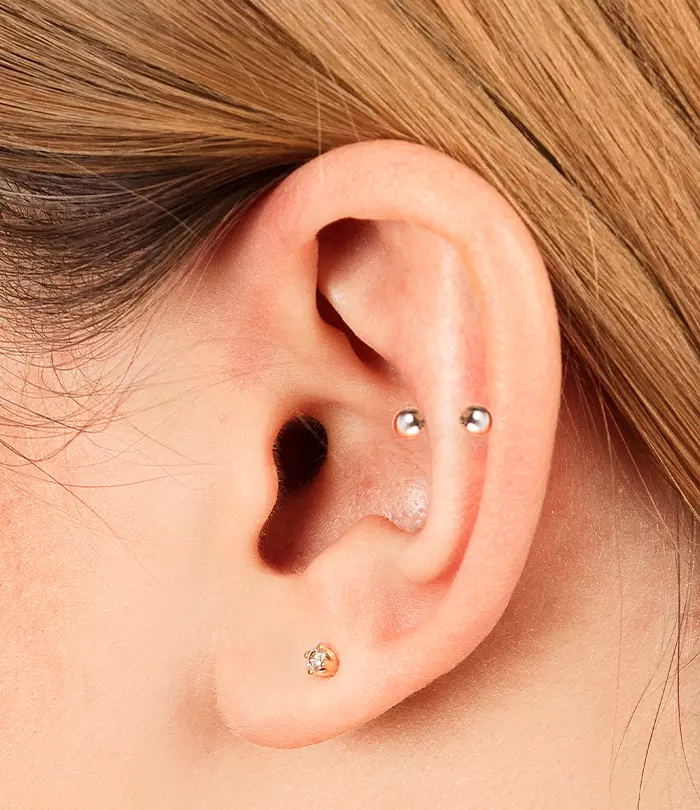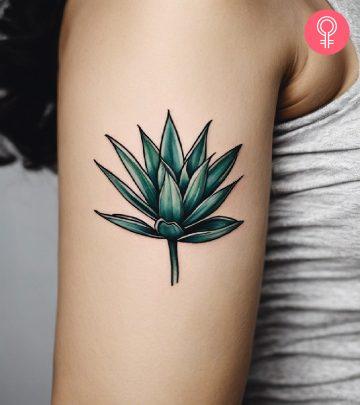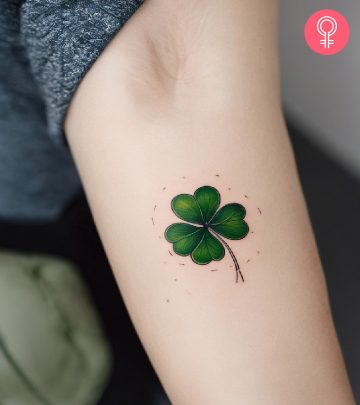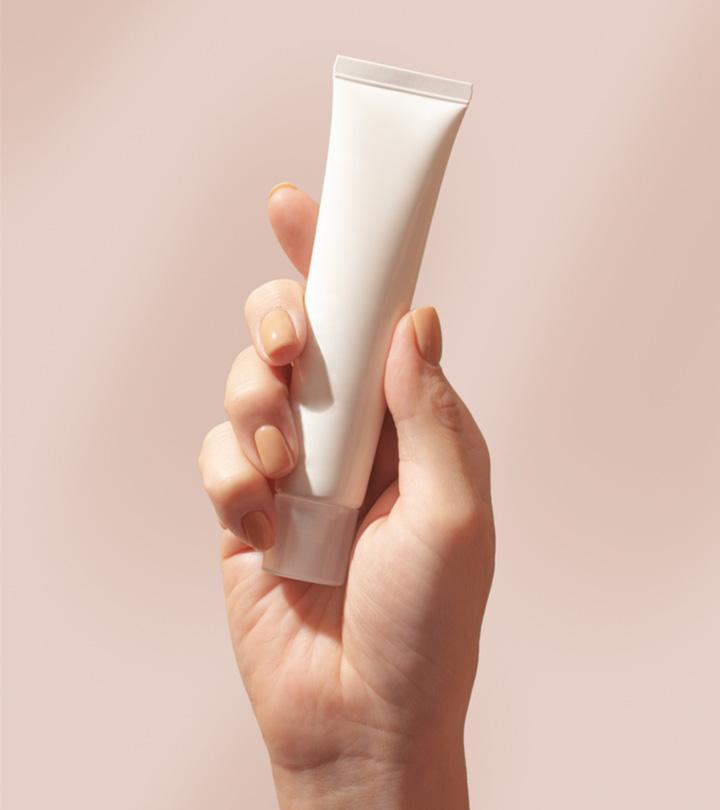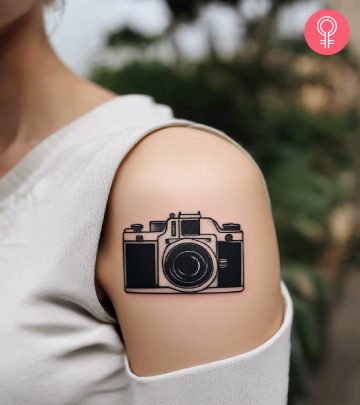8 Piercings Ranked From Least To Most Painful
Discover the pain level of different piercings before getting one that captures your essence.

Image: Shutterstock
Imagine walking down the road with a cool eyebrow or septum piercing. So cool and edgy, right? But before you decide to get one, it is important to be aware of the most painful piercing and least painful piercing spots on the body to help determine the right one for you. Remember, a piercing requires time and commitment to ensure its longevity. So, whether you are a curious newbie or a seasoned expert looking for something different, this article provides you with insights into the healing time, pain level, and risks associated with different types of piercings. Scroll down to know more!
In This Article
Why Do Piercings Cause Pain?
All forms of body piercing involve puncturing the skin with a sharp needle to create holes for the jewelry to thread in. That is why there is a level of pain associated with the piercing process. However, how uncomfortable or painful the actual process is depends on the person’s pain tolerance and the body piercer’s skill and expertise.
Some may report it as a pinch, others may report it as a quick sting or a very painful sensation. Ultimately, the perception of pain and the amount of attention given during the body modification process varies from person to person as some may deal with it better than other people (1).
Having said that, it is important to understand that pain is not always just physical, it can be mental too. Some people may like the pain they experience during the procedure, which might make their experience different from the ones who are nervous and cannot tolerate pain.
Another important factor that may play a role in this process is gender and how they cope with pain. For instance, men use problem-focused activities to distract themselves from the pain whereas women use social support to cope with pain (2).
Apart from this, the location and complexity of the piercing can also influence the pain level.
While the level of pain experienced by a person is subjective, everyone will experience an initial discomfort as the process involves puncturing the skin with a needle. However, the location also plays a key role as each body part experiences different levels of pain. Check out the section below for a piercing pain chart to get a better idea.
Piercing Pain Chart
Whether you are a first-timer or a piercing enthusiast, looking at a piercing pain chart can help you prepare yourself before you take the plunge. The different colors in the chart indicate different levels of pain. However, one must keep in mind that piercing pain can vary from individual to individual depending on the pain tolerance level, mood, or whether or not the person has had sufficient sleep the night before the piercing appointment, etc. We have provided a piercing pain chart from the front and the back portion of the body to help you get a better idea.
As stated earlier, there is no one-size-fits-all approach to piercings. Regardless of where you decide to get the piercing done, having an idea about the different piercing sports can help ensure a more comfortable experience. Scroll down to the next section for the most and least painful piercing spots in the body.
8 Most Painful Piercings To Least Painful Piercings
Piercing may hurt more on certain parts of the body such as the face and nipples due to the presence of nerve endings and less fat under the skin. Here is a breakdown of different types of piercings from most to least painful based on the level of pain they may cause and healing time.
Most Painful Piercings
As stated earlier, body areas with more nerve endings may experience more pain during the piercing process. Some of the most painful spots for piercing include:
- Genital Piercings
The genital area is considered the most painful place to get pierced due to the presence of a lot of nerve endings (3). Additionally, the level of pain may also depend on the location and complexity of the piercing. Similarly, the clitoris piercing may also be sensitive to pain due to the presence of abundant nerve endings (4).
Pain Scale: 7/10
Healing Time: 4-6 weeks
- Nipple Piercings
It is probably the second most painful piercing spot after genital piercing. This erogenous zone is replete with nerves that directly connect to the brain, which means its overstimulation can elicit sexual pleasure but can lead to increased pain (5).
Pain Scale: 7/10
Healing Time: 9-12 months
 Trivia
TriviaA blogger shares her experience of getting a nipple piercing in her blog. She said, ” I was in so much pain and my breast was so large that it felt like it was going to burst. Ended up going to the local ER because it was after hours and the pain was unbearable (i).“
- Nose Piercings
The pain level depends on the location of the piercing. Here are some nose piercings and their pain level:
- Septum Piercing
It can be very painful as it involves piercing through the septum or the tissue between the two nostrils. On a similar line deviated septum or overactive septum nerve condition can also make the feeling of being pierced much more intense here.
Pain Scale: 6/10
Healing Time: 2-6 months
- High Nostril Piercing
View this post on Instagram
This type of piercing involves piercing the top area of the nose with thicker cartilage, which may hurt more compared to areas with more fat and take longer to heal as well.
Pain Scale: 5/10
Healing Time: 4-6 months
- Dermal Piercings
This skin piercing involves creating a puncture with no exit hole, unlike traditional piercings. The pain level can vary depending on the amount of nerve endings present, the skin thickness, and the closeness to the veins.
Pain Scale: 6/10
Healing Time: 1-3 months
 Did You Know?
Did You Know?If you are someone who does not have a good pain tolerance, then here are some of the least painful piercing spots you should be aware of. Scroll down to find out.
Least Painful Piercings
Areas with fat and fewer nerve endings are likely to cause less piercing pain as compared to bony areas. Some of the least painful spots for piercing include:
- Ear Piercings
Ear piercings are a popular and common choice among newbies and enthusiasts because they generally hurt less due to the presence of delicate tissues. Some of these include:
- Helix Piercing
View this post on Instagram
It involves piercing the outer edge of the upper ear cartilage. Many people get double or triple ear piercings in this area due to the thin cartilage tissues.
Pain Scale: 4/10
Healing Time: 3-6 months
- Earlobe Piercing
It involves piercing the lower, flesh part of the ear. This is one of the most common ear piercings among children and adults due to the low pain level.
Pain Scale: 3/10
Healing Time: 4-6 months
- Belly Button Piercing
Navel piercings are considered one of the least painful piercings due to the presence of thicker skin and fewer nerve endings, making them a popular and edgy piercing around the globe.
Pain Scale: 4/10
Healing Time: 6-12 months
- Eyebrow Piercings
This facial piercing does not usually hurt too badly. Even though there are some nerves present in the brow area, the needle doesn’t puncture through a lot of skin, making the pain level low.
Pain Scale: 3/10
Healing Time: 3 months
- Tongue Piercings
While the tongue might feel like a sensitive spot, in reality, many consider the pain low because the needle pierces through a lot of connective tissues than the cartilage or skin.
However, one must also note that this area may take some time to heal due to it being wet, which may increase the risk of infection.
Pain Scale: 4/10
Healing Time: 4-8 weeks
Piercings continue to reign supreme in the realm of body modification. They are edgy and allow people to express themselves unabashedly. However, understanding the pain level associated with piercing different areas of the body can help you make an informed decision and manage your anxiety during the piercing process. Therefore, research and find a professional piercer. Go through the piercing pain chart together and understand the pros and cons of each piercing and its healing period before finalizing the one you want.
Frequently Asked Questions
Can certain health conditions affect the pain of a piercing?
Yes, conditions such as blood disorders, autoimmune disorders, skin allergies, pregnancy, etc can cause inflammation and make one more sensitive to pain or the perception of pain (6), (7), (8), (9).
How does the pain of a piercing compare to other body modifications?
The pain of piercing can vary depending upon the individual pain threshold, placement, and complexity of the piercing. However, most people report the pain as a brief and sharp sensation. On the other hand, a process like tattooing and dermal implants can cause severe and intense pain during the procedure.
Key Takeaways
- The level of pain experienced during the body piercing procedure is highly subjective and can vary from person to person.
- The most painful piercing areas are the genitals and nipples.
- The least painful piercing areas are the belly button, tongue, and eyebrow.
Piercing some body parts may hurt a little more than others. So, if you are thinking of getting one, check out this video to learn about the least painful piercing spots in the body.
Personal Experience: Source
StyleCraze's articles are interwoven with authentic personal narratives that provide depth and resonance to our content. Below are the sources of the personal accounts referenced in this article.
(i). Nipple Piercing Horror Story
https://nipplepiercingbad.blogspot.com/2010/09/my-experience-with-nipple-piercings.html
References
Articles on StyleCraze are backed by verified information from peer-reviewed and academic research papers, reputed organizations, research institutions, and medical associations to ensure accuracy and relevance. Read our editorial policy to learn more.
- Pain from perception to action: A computational perspective
https://www.ncbi.nlm.nih.gov/pmc/articles/PMC9771728/ - Sex differences in pain: a brief review of clinical and experimental findings
https://www.ncbi.nlm.nih.gov/pmc/articles/PMC3690315/#:~:text=While%20men%20tend%20to%20use,cognitive%20reinterpretation%2C%20and%20attentional%20focus. - Anatomy Abdomen and Pelvis Penis
https://www.ncbi.nlm.nih.gov/books/NBK482236/#:~:text=The%20glans%20penis%20has%20a,arteries%20which%20supply%20erectile%20tissue. - Management of Retained Genital Piercings: A Case Report and Review
https://downloads.hindawi.com/journals/criog/2017/2402145.pdf - Women’s clitoris vagina and cervix mapped on the sensory cortex: fMRI evidence
https://pubmed.ncbi.nlm.nih.gov/21797981/ - Pain and pain management in haemophilia
https://www.ncbi.nlm.nih.gov/pmc/articles/PMC5087566/ - Autoimmune regulation of chronic pain
https://www.ncbi.nlm.nih.gov/pmc/articles/PMC8108590/#:~:text=Pain%20in%20autoimmune%20disease%20has,of%20proinflammatory%20cytokines%20or%20peptides. - Dermatological Conditions Inducing Acute and Chronic Pain
https://www.ncbi.nlm.nih.gov/pmc/articles/PMC9609987/#:~:text=Some%20skin%20diseases%20are%20conventionally,can%20also%20cause%20significant%20pain. - Individual Characteristics and Pain Sensitivity during Pregnancy—A Cross-Sectional Study in Pregnant and Non-Pregnant Women
https://www.ncbi.nlm.nih.gov/pmc/articles/PMC9657085/#:~:text=The%20main%20results%20of%20the,than%20in%20the%20comparison%20group.
Read full bio of Eshna Das
Read full bio of Shreya Mukherjee




